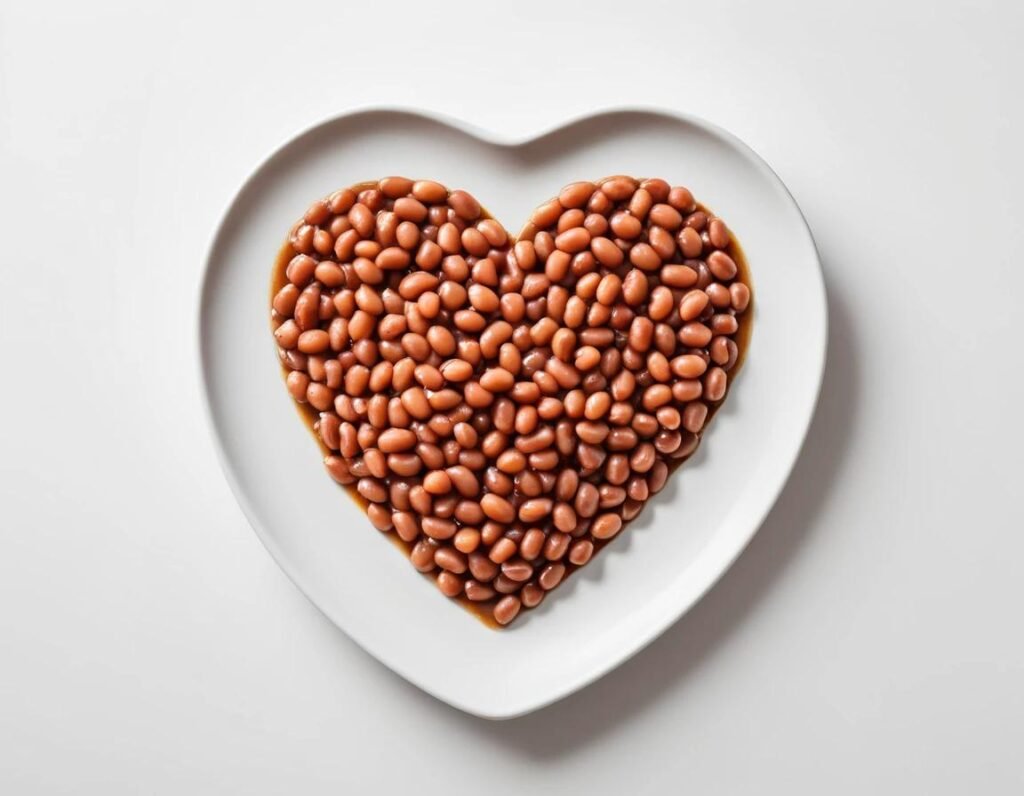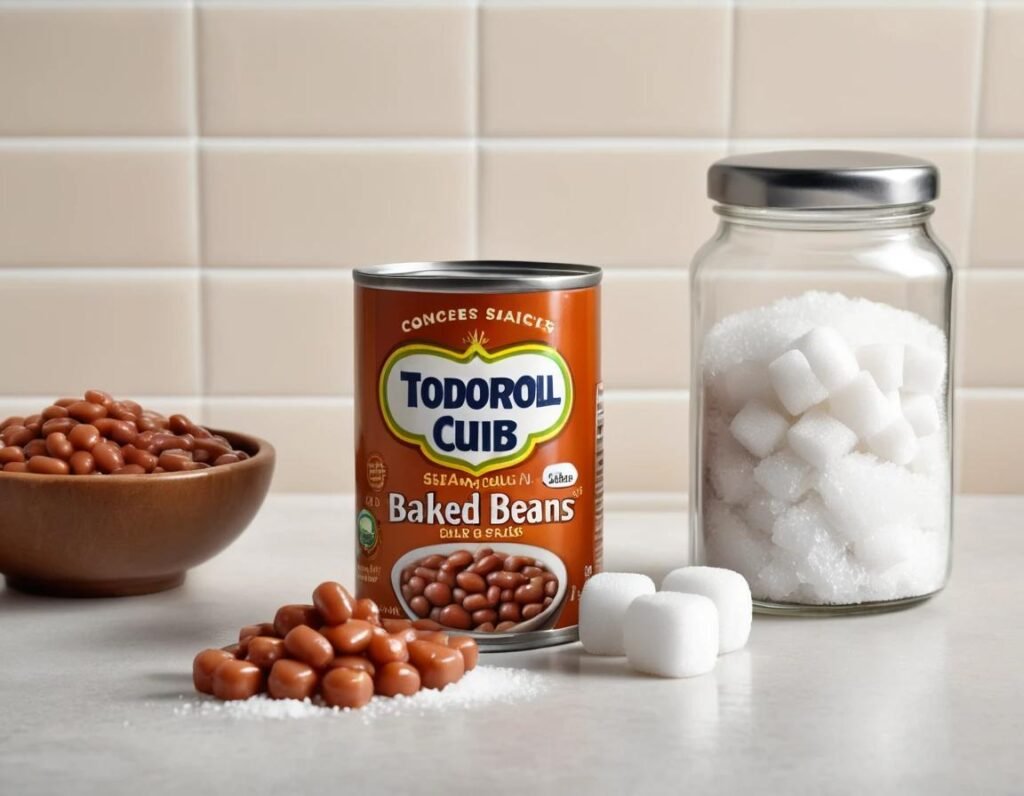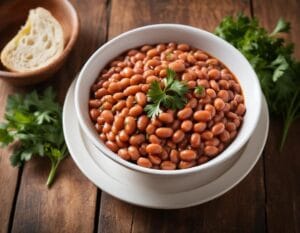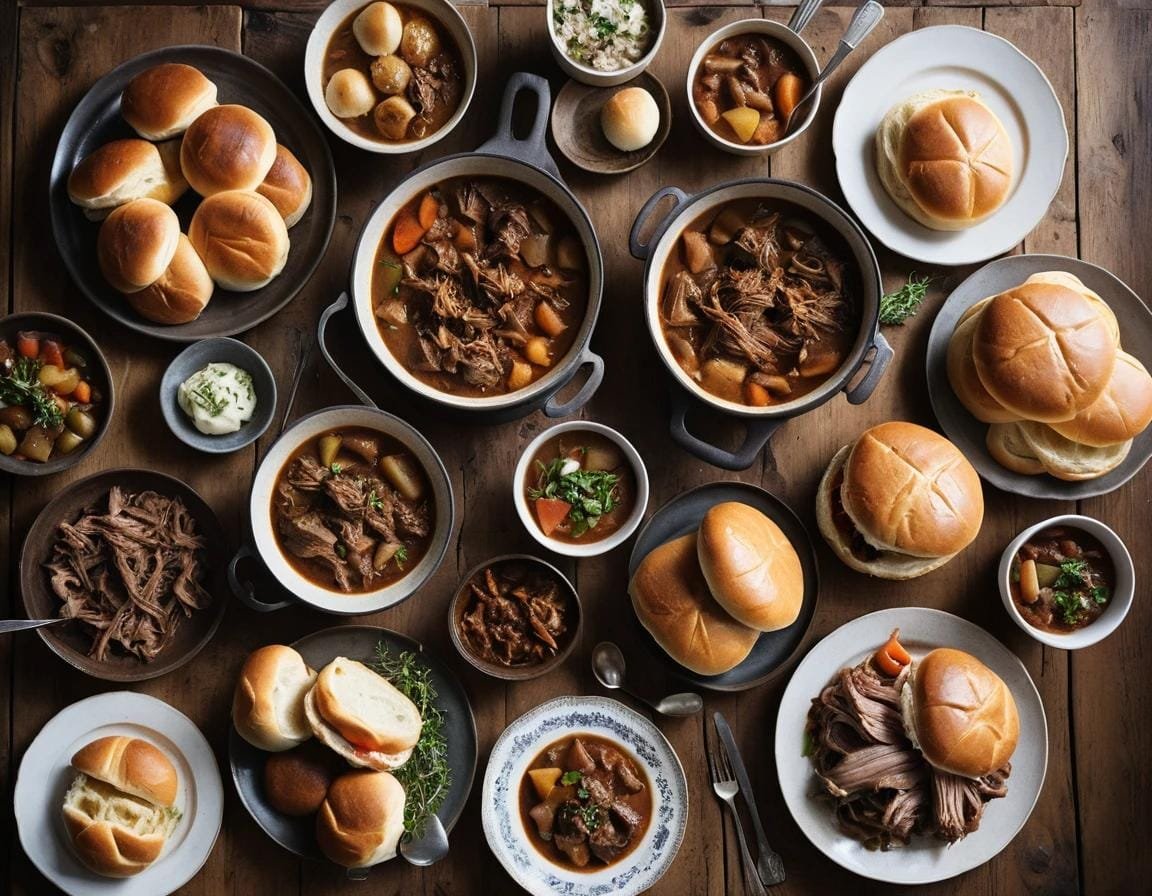Table of Contents
Introduction:
Baked beans are a staple in many households, often enjoyed as a quick side dish or a hearty addition to meals. While they are undeniably delicious and convenient, many wonder, “Are baked beans healthy?” The answer isn’t straightforward and depends on several factors, including the ingredients, portion size, and overall dietary context.
In this article, we’ll explore the nutritional profile of baked beans, their potential health benefits, and some drawbacks to consider. You’ll also find practical tips on how to make healthier choices when it comes to enjoying this classic comfort food. By the end, you’ll have a clear understanding of whether baked beans deserve a place in your balanced diet.
Nutritional Profile of Baked Beans
To determine whether baked beans are healthy, it’s essential to analyze their nutritional components. Baked beans, traditionally made from navy beans, are a nutrient-dense food that offers a range of macronutrients, vitamins, minerals, and fiber. However, the preparation method—homemade or canned—can impact their nutritional value.
Macronutrients in Baked Beans
Baked beans are a good source of carbohydrates and protein, which makes them a filling food option. Here’s a breakdown of their macronutrient composition per one-cup serving (about 250 grams):
- Carbohydrates: Around 50 grams per serving. A significant portion comes from natural and added sugars, particularly in canned baked beans.
- Protein: Contains approximately 12 grams, making it a decent plant-based protein source.
- Fat: Low in fat, typically less than 1 gram unless additional fats are added during preparation.
The combination of protein and carbohydrates provides energy and helps with muscle repair, making baked beans a versatile food option for various diets.
Vitamins and Minerals
Baked beans are a powerhouse of essential vitamins and minerals, particularly when made with minimal processing. Key nutrients include:
- Iron: Supports oxygen transport in the blood and prevents anemia.
- Magnesium: Crucial for muscle function and bone health.
- Potassium: Helps regulate blood pressure and electrolyte balance.
- Folate: Essential for DNA synthesis and healthy cell function.
- B Vitamins: Aid energy production and promote brain health.
Homemade baked beans tend to retain more nutrients, while canned varieties may lose some due to processing.
Fiber Content and Its Benefits
One of the standout features of baked beans is their high fiber content. A one-cup serving provides approximately 10 grams of dietary fiber, fulfilling about 40% of the daily recommended intake for adults.
- Digestive Health: Fiber promotes regular bowel movements and prevents constipation.
- Heart Health: Soluble fiber in baked beans can help lower cholesterol levels, reducing the risk of heart disease.
- Blood Sugar Control: Fiber slows digestion, leading to steadier blood sugar levels and reducing spikes after meals.
Whether enjoyed as part of a breakfast spread or a dinner side, baked beans offer a nutrient-rich option that supports overall health.
Health Benefits of Baked Beans
Baked beans offer a variety of health benefits due to their nutrient profile, making them a valuable addition to a balanced diet. From promoting heart health to supporting digestive function, their advantages are both diverse and impactful.

Heading 3: Promoting Heart Health
Baked beans contain nutrients that are beneficial for cardiovascular health:
- Soluble Fiber: Helps reduce levels of LDL (bad) cholesterol, which can lower the risk of heart disease.
- Potassium: Aids in managing blood pressure by balancing the effects of sodium.
- Low Fat Content: Naturally low in fat, baked beans can fit well into heart-friendly diets.
Several studies suggest that regular consumption of legumes, like beans, can decrease the risk of cardiovascular diseases, particularly when they replace processed or high-fat foods.
Supporting Digestive Health
The high fiber content in baked beans is excellent for maintaining a healthy digestive system.
- Promotes Regularity: Insoluble fiber bulks up stool and prevents constipation.
- Feeds Good Gut Bacteria: Beans contain prebiotic fibers that act as food for beneficial gut bacteria, improving overall gut health and boosting immunity.
- May Reduce Inflammation: A well-balanced gut microbiome, supported by dietary fiber, can help reduce inflammation in the gastrointestinal tract.
Including baked beans in your diet can be a practical way to enhance your digestive system’s efficiency.
Helping with Weight Management
Baked beans can aid in weight management when consumed in appropriate portions:
- Satiating Effect: The combination of protein and fiber in baked beans helps you feel full longer, reducing overall calorie intake.
- Low-Calorie Option: Despite being nutrient-dense, baked beans are relatively low in calories, especially when made at home without added sugars.
- Regulates Cravings: The slow-digesting carbohydrates in baked beans prevent sudden blood sugar spikes, helping control hunger and energy levels.
For individuals on weight-loss plans, baked beans can serve as a wholesome and satisfying meal component.
A Source of Plant-Based Protein
For those following vegetarian or vegan diets, baked beans provide a practical source of plant-based protein:
- Supports Muscle Maintenance: The protein content aids in repairing and maintaining muscles, especially for active individuals.
- Versatile in Recipes: Baked beans can be used in salads, soups, and even as a topping, making it easier to incorporate them into a variety of meals.
Baked beans’ combination of protein, fiber, and essential nutrients makes them a standout choice for those seeking plant-based food options that support multiple aspects of health.
Potential Drawbacks of Baked Beans
While baked beans offer many health benefits, it’s essential to consider potential downsides that could affect their nutritional value or digestibility. Being aware of these drawbacks helps make informed dietary choices.

Added Sugars and Sodium Levels
Many commercially available baked beans contain significant amounts of added sugars and sodium, which can negate some of their health benefits.
- Sugar Content: Canned baked beans often include sweeteners such as high-fructose corn syrup or brown sugar, with some brands containing up to 12 grams of sugar per serving. High sugar intake is linked to weight gain, diabetes, and other chronic conditions.
- High Sodium: A single serving of canned baked beans can have up to 1,000 milligrams of sodium, nearly half the recommended daily limit for adults. Excess sodium consumption is associated with high blood pressure and increased cardiovascular risks.
Health Tip: Opt for brands labeled “low-sodium” or “no added sugar” to reduce these potential risks.
Flatulence and Digestive Discomfort
Beans, including those in baked beans, contain complex carbohydrates called oligosaccharides, which are difficult for the body to break down.
- Gas and Bloating: As these carbohydrates reach the large intestine, gut bacteria ferment them, producing gas that can lead to discomfort.
- Adjustment Period: For individuals not accustomed to high-fiber foods, sudden inclusion of baked beans can temporarily upset digestion.
Solution: Soaking beans before cooking or consuming smaller portions initially can help the body adapt.
Allergies and Sensitivities
Although rare, some individuals may experience allergic reactions or intolerances to specific components in baked beans:
- Legume Allergies: Some people are allergic to legumes, including navy beans, which are the primary ingredient in baked beans.
- Food Additives: Canned baked beans may contain preservatives or flavorings that can trigger sensitivities in certain individuals.
If you suspect a reaction to baked beans, consult a healthcare provider to identify and manage the cause effectively.
Environmental and Ethical Concerns
For those concerned with sustainability, the production and packaging of commercially processed baked beans may raise environmental issues.
- Canning Impact: Canned foods have a higher carbon footprint due to the energy involved in processing and packaging.
- Sourcing Ingredients: Ethical sourcing of beans and other ingredients may be a consideration for eco-conscious consumers.
Homemade baked beans can address many of these concerns by reducing reliance on pre-packaged options.
While baked beans are generally considered healthy, moderation and mindful choices are key to minimizing these potential drawbacks.
Tips for Choosing Healthier Baked Beans
To enjoy the health benefits of baked beans while minimizing potential drawbacks, selecting or preparing them carefully is crucial. Whether you’re shopping for canned options or making them from scratch, these tips can help you make more nutritious choices.
Opt for Low-Sodium Options
Excess sodium in canned baked beans is a common concern, but there are ways to manage it:
- Read Labels: Look for products labeled “low-sodium” or “no added salt.” These options significantly reduce sodium content while retaining flavor.
- Rinse Before Eating: If you purchase regular canned baked beans, rinsing them under running water can remove some of the sodium from the sauce.
- DIY Seasoning: Preparing baked beans at home allows you to control the salt content. Experiment with herbs and spices like garlic, paprika, or cumin for added flavor without extra sodium.
Lowering sodium intake supports heart health and helps prevent conditions like hypertension.
Avoid Added Sugars
Sugar is often added to enhance the taste of baked beans, but healthier alternatives exist:
- Check Sugar Content: Opt for products with “no added sugar” or less than 6 grams of sugar per serving.
- Natural Sweeteners: If you’re making baked beans at home, consider using natural sweeteners like honey, molasses, or pureed dates in moderation.
- Plain Varieties: Choose plain canned beans and add your preferred sauce or seasonings to control sweetness levels.
Reducing sugar intake helps manage blood sugar levels and minimizes risks associated with diabetes and obesity.
Homemade vs. Store-Bought Baked Beans
Making baked beans from scratch is one of the healthiest ways to enjoy them. Here’s a comparison:
- Homemade Baked Beans:
- Pros: Full control over ingredients, including salt, sugar, and flavorings.
- Cons: Takes more time to prepare.
- Pro Tip: Use dried beans instead of canned beans for even greater control over the final product.
- Store-Bought Baked Beans:
- Pros: Convenient and quick, with many options available.
- Cons: Often contain preservatives, added sugars, and higher sodium levels.
- Pro Tip: Compare brands and choose products with simple ingredient lists.
By balancing convenience with nutritional value, you can make baked beans a healthier staple in your diet.
Portion Control and Meal Pairings
Even the healthiest baked beans can contribute to an unbalanced diet if consumed in excess. Here’s how to enjoy them wisely:
- Stick to Serving Sizes: A standard serving of baked beans is about 1/2 cup (approximately 130 grams). Pay attention to portion sizes to avoid overeating.
- Balance Your Plate: Pair baked beans with whole grains (like brown rice) and fresh vegetables to create a complete, nutrient-dense meal.
- Use as a Side Dish: Incorporate baked beans into meals in smaller quantities to complement other healthy dishes.
With these strategies, you can enjoy baked beans regularly as part of a balanced, health-conscious diet.
FAQs
Are canned baked beans less healthy than homemade?
Canned baked beans can be less healthy due to added sugars, sodium, and preservatives. However, many brands now offer healthier options labeled “low-sodium” or “no added sugar.” Homemade baked beans provide full control over ingredients, making them the healthier choice when time allows.
Can baked beans fit into a low-carb diet?
Baked beans are relatively high in carbohydrates due to their natural starch content and added sugars in some recipes. While not ideal for strict low-carb diets, small portions can fit into moderate-carb meal plans, especially when paired with protein and healthy fats.
Are baked beans good for diabetics?
Baked beans can be suitable for diabetics if consumed in moderation and with minimal added sugar. Their high fiber content helps regulate blood sugar levels, but it’s essential to check the nutrition label for sugar and carbohydrate content.
How often should I eat baked beans?
Baked beans can be enjoyed a few times a week as part of a balanced diet. Moderation is key, especially if consuming canned varieties with higher sodium or sugar levels. Rotate baked beans with other legumes to diversify your nutrient intake.
Are baked beans suitable for children?
Yes, baked beans can be a healthy food option for children, providing protein, fiber, and essential nutrients. Opt for low-sodium, low-sugar varieties or make them at home to ensure they’re suitable for young palates and nutritional needs.
Can I eat baked beans if I have IBS?
Baked beans may trigger symptoms in individuals with Irritable Bowel Syndrome (IBS) due to their oligosaccharide content, which can cause gas and bloating. If you have IBS, try smaller portions or look for specially formulated low-FODMAP baked beans.
Conclusion
Baked beans can be a nutritious and versatile addition to your diet, offering a wealth of health benefits, including improved heart health, better digestion, and support for weight management. However, it’s crucial to be mindful of potential drawbacks, such as added sugars, sodium, and digestive discomfort.
Making informed choices—like opting for low-sodium, no-added-sugar varieties or preparing homemade baked beans—can help maximize their benefits while minimizing risks. When enjoyed in moderation and paired with other nutrient-dense foods, baked beans can be part of a healthy and satisfying diet for people of all ages.
You Might Also Like:
- Baked Beans Recipe – The Ultimate Guide for Perfect Flavor
Learn how to make baked beans from scratch for a healthier and tastier option. - Delicious Cottage Cheese Recipes You Should Try Today
Explore mouthwatering recipes that make healthy eating enjoyable and easy. - The Ultimate Guide to Texas Sheet Cake
A comprehensive guide to baking a perfect Texas sheet cake, including tips to make it moist and flavorful.





